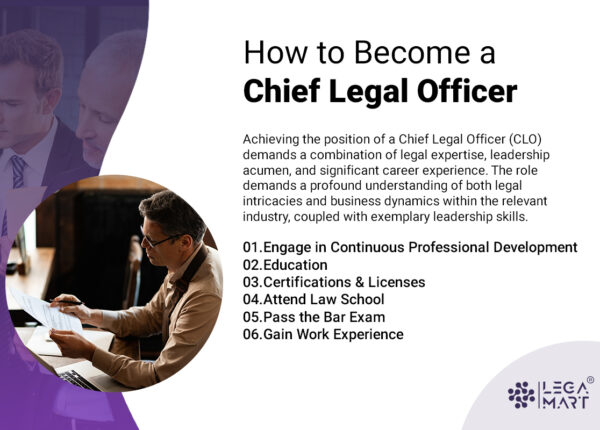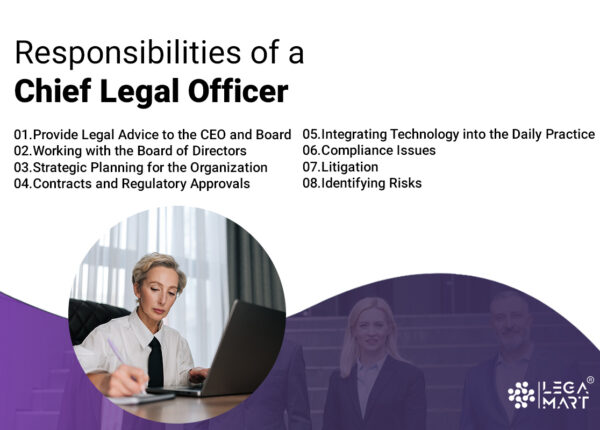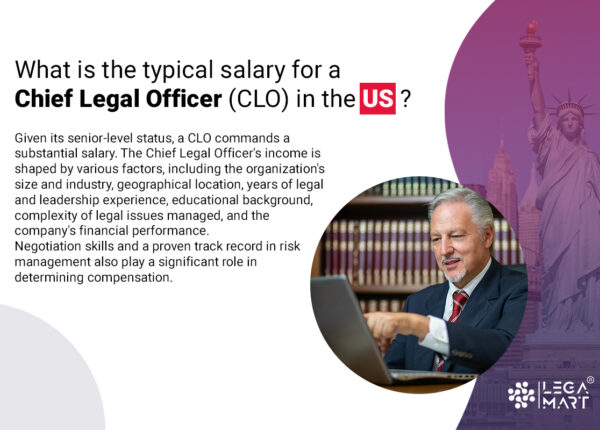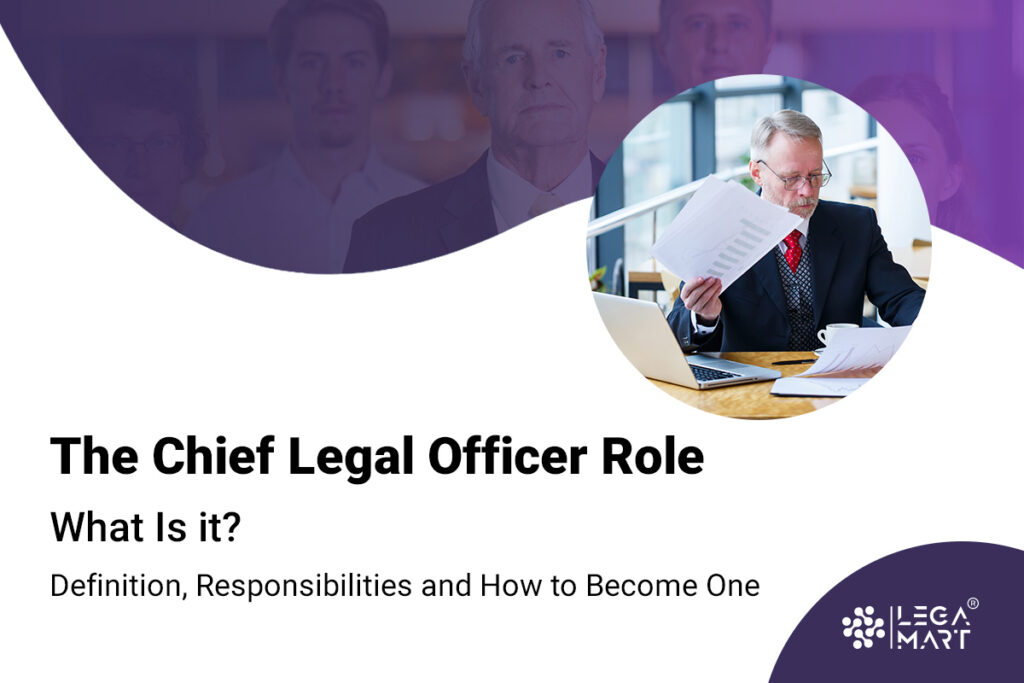Kent Walker, the President of Global Affairs and Chief Legal Officer at Google, plays a pivotal role in advising Google’s board and management on legal and policy matters. Since joining Google, Kent Walker has been at the forefront of addressing the intersection of technology, policy, and legal issues. In his capacity as Chief Legal Officer, he oversees the company’s engagement with governments globally, shapes content policies across its various services, and contributes to its philanthropic endeavors. Walker’s expertise highlights the integral role of a Chief Legal Officer in guiding a technology giant like Google through the complex landscape of legal and policy challenges while ensuring alignment with global stand.

Introduction
The position of a Chief Legal Officer (CLO) represents a contemporary evolution beyond the traditional role of General Counsel. This multidimensional c-suite role focuses on overseeing the legal department while extending its responsibilities to include providing innovative business solutions, delivering insightful legal analysis aligned with the company’s business model, and mitigating risks. Distinguishing itself from the General Counsel role, a CLO is often viewed as a strategic business partner. Besides, as the most influential legal executive in many publicly traded companies, the CLO’s responsibilities span advising fellow executives, guiding board members to mitigate legal risks, and overseeing the intricate legal landscape in which the organization operates. The CLO’s expertise not only safeguards the company’s interests but also shapes its ethical framework and policies, ensuring a harmonious alignment with legal standards and societal expectations.
If you find the intersection of law and business intriguing, a career in corporate law might be an appealing path. Corporate lawyers specialize in guiding companies to navigate legal complexities, ensuring adherence to regulations, and minimizing the risk of litigation in their operations. As you gain experience in the legal field, you can aspire to climb the professional ladder, ultimately reaching the senior-level position of a Chief Legal Officer. This article explores the integral aspects of a Chief Legal Officer’s role, from offering legal guidance to navigating regulatory landscapes, to becoming a crucial part of executive decision-making.
Understanding the Chief Legal Officer (CLO) Role
The Chief Legal Officer (CLO) is a term gaining prominence, and it prompts a common question: how does it differ from the role of General Counsel (GC)? The former encompassed a broader organizational role beyond legal matters. The GC primarily focuses on legal aspects, managing compliance and corporate governance, while the CLO integrates legal considerations into the overall organizational framework to enhance company performance.
A good example being Vijaya Gadde, the former Chief Legal Officer at Twitter, who exemplifies the evolving role of a CLO. In her tenure, she addressed challenges such as responding to harassing and false news tweets and played a pivotal role in the decision to terminate ex-President Donald Trump’s Twitter account. Having previously served as Twitter’s General Counsel, Gadde’s trajectory highlights the transition from a more traditional legal executive to a strategic business partner in the C-Suite.
In essence, the CLO, positioned in the C-Suite, acts as a crucial liaison between the business and legal teams. Beyond legal expertise, an effective CLO demonstrates business acumen, contributing as a strategic partner to the executive team. While specific approaches to the CLO role may vary, common objectives include:
- Embracing technology:
A Chief Legal Officer (CLO) integrates technology into the legal team’s daily operations to enhance efficiency. This may involve modernizing the legal team through the use of technology like matter management, contract AI, and workflow tools, even though it requires overcoming challenges related to mindset recalibration and upskilling.
- Leading with metrics:
This involves managing outside counsel expenditure, reducing contract cycle times, and fulfilling internal legal requests. A successful Chief Legal Officer (CLO) aligns these metrics with company-wide objectives, showcasing how optimal legal performance positively impacts the company’s overall metrics.
- Be an integrator:
Acting as a mediator between legal and executive teams and the broader business, the CLO identifies opportunities to align the legal team’s skills with other business units, fostering beneficial lateral relationships.
What is a Chief Legal Officer?
A Chief Legal Officer (CLO) is a legal executive entrusted with overseeing a company’s legal department. In this capacity, the CLO leads in-house attorneys, provides strategic guidance on significant legal and regulatory matters, and actively works to mitigate legal risks. Typically, the professional journey of a CLO includes prior roles such as head of legal, general counsel, and general partner. The CLO may hold a position on the company’s operating committee and reports to the CEO.
With a Juris Doctor (JD) degree, state license, and a wealth of corporate experience, a CLO brings extensive legal expertise to the role. Their responsibilities encompass keeping the company informed about legal changes affecting the firm or industry. As the head of the corporate legal department, the CLO plays a crucial role in managing and overseeing all aspects of the company’s legal affairs, drawing from a background that includes previous positions as head legal, first general counsel, and law firm partner.
How to Become a Chief Legal Officer

Achieving the position of a Chief Legal Officer (CLO) demands a combination of legal expertise, leadership acumen, and significant career experience. The role demands a profound understanding of both legal intricacies and business dynamics within the relevant industry, coupled with exemplary leadership skills. Typically, CLOs boast a background as law firm partners, first general counselors, or heads of legal departments. The journey to becoming a qualified Chief Legal Officer involves the following steps:
Qualifications
1. Education:
- Obtain a professional degree, such as a Juris Doctor (JD), from an accredited law school, emphasizing law, ethics, and corporate governance.
- Consider majors in pre-law, political science, or related fields during undergraduate studies.
- Pursue advanced degrees like an LLM or an MBA to bolster your qualifications.
2. Certifications & Licenses:
- CLOs typically hold a Juris Doctor (JD) degree and must pass the bar exam in their intended state of practice.
3. Attend Law School:
- Enroll in a Juris Doctor (JD) program, typically spanning three years.
- Specialize in corporate law during the program, encompassing subjects like business law, corporate finance, intellectual property law, real estate law, and employment law.
4. Pass the Bar Exam:
- Obtain state licensure by passing the bar exam in your chosen state.
- The exam varies by state, necessitating preparation and often includes a background check for admission to the bar.
- The bar exam covers various legal aspects and is a standard requirement for practicing law.
5. Gain Work Experience:
- Accumulate a blend of on-the-job experience and participation in formal training programs focusing on legal management, corporate governance, and compliance.
- Progress from roles as practicing attorneys, with potential advancement through internal promotions or applications to higher-level positions.
- Develop expertise as a law firm partner, head of legal, or first general counselor by managing legal teams, developing legal strategies, and interacting with senior management and external stakeholders.
6. Engage in Continuous Professional Development:
- Undergo leadership training to enhance management skills.
- Stay updated on the latest legal trends and regulations through workshops and seminars.
- Demonstrate a commitment to continuous learning and professional growth.
Key Features of the Chief Legal Officer Role
The modern Chief Legal Officer (CLO) embodies a multidimensional role, extending beyond exceptional legal expertise to encompass strategic thinking and senior executive responsibilities at the highest organizational level. The CLO navigates the following features, to effectively contribute to the company’s success: Strategist, Catalyst, Guardian, and Operator.
1. Strategist:
In the role of a strategist, the Chief Legal Officer’s main task is to provide their business partners with a clear legal strategy that aligns and supports the overall business strategy. Their responsibility is to offer legal guidance to the senior executive team, helping them achieve their growth objectives in addition to;
- Aligning legal strategy with business strategy, supporting growth objectives.
- Anticipating and proactively addressing changes in regulatory requirements and public policy.
- Building strong relationships with leadership teams and board members.
2. Catalyst:
As a catalyst, the Chief Legal Officer’s focus is on creating a competitive advantage by applying a legal perspective. Their crucial guidance assists the executive leadership team in choosing the right direction for the business, establishing a tone at the top that fosters success. Other responsibilities entails;
- Fostering legal teams as trusted business advisors, actively contributing to solutions.
- Developing corporate risk profiles and robust company-wide compliance frameworks.
- Driving a corporate culture aligned with values around compliance and integrity.
3. Guardian:
In guardian mode, the Chief Legal Officer’s role is to navigate legal and regulatory matters for the business. This involves guiding the in-house legal team through complexities and mitigating risks, forming the foundational responsibility for the legal aspects of the business. Additional responsibilities include:
- Navigating legal and regulatory matters, managing compliance risks.
- Address exposure to brand and reputation risks while upholding governance on legal issues.
- Safeguarding corporate integrity and embodying a tone at the top within the legal department.
4. Operator:
In the operator role, a significant portion of the Chief Legal Officer’s time is dedicated to optimizing the capabilities, talent, service levels, costs, and legal structure essential for effectively serving your business partners. This involves ensuring that the legal operations are streamlined and efficient. Other roles include;
- Developing leadership and succession plans for the legal function, including the CLO role.
- Implementing key performance metrics for the legal organization and external counsel.
- Identifying and addressing skill gaps, implementing technology solutions, and optimizing the legal operating model.
What Does a Chief Legal Officer Do?
The role of a Chief Legal Officer (CLO) can vary across companies, with specific duties adapting to the organization’s structure. Generally, a CLO informs executive leadership about new or changing laws relevant to their operations and industry. They might establish educational programs for employees to comprehend legal matters pertinent to their roles or the company’s operations.
Responsibilities of a Chief Legal Officer:

The typical responsibilities of a chief legal officer involve;
- Provide Legal Advice to the CEO and Board:
As part of the C-Suite, the Chief Legal Officer acts as a vital link between the business and legal teams, providing legal advice to the CEO and Board. With a blend of legal expertise and business acumen, a successful CLO serves as a strategic partner to the executive team, proactively identifying and addressing issues before they escalate into legal risks.
- Working with the Board of Directors:
Leveraging their knowledge of the entire enterprise, CLOs contribute to strategic discussions, such as mergers, acquisitions, ESG matters, crisis resilience, regulatory landscapes, and board diversity, extending beyond traditional corporate secretary duties.
- Strategic Planning for the Organization:
A Chief Legal Officer (CLO) not only operates as a strategic thinker but also holds a senior executive position, addressing unprecedented business challenges with a focus on maintaining ethical standards and fostering strong relationships with stakeholders.
- Contracts and Regulatory Approvals:
Understanding contracts and confidentiality agreements, the CLO ensures managers comprehend how their actions can impact the company’s legal standing. They oversee processes requiring regulatory approvals to prevent legal issues.
- Integrating Technology into the Daily Practice:
The Chief Legal Officer (CLO) plays a crucial role in modernizing the legal team for enhanced efficiency. Their unique advantage over General Counsel lies in their ability to strategically leverage technology, utilizing tools like matter management, contract AI, and workflow systems for optimal business outcomes.
- Compliance Issues:
CLOs keep the company informed about compliance matters, ensuring adherence to laws in hiring processes, product labeling, health and safety codes, and mandated government reports.
- Litigation:
In case of litigation, the CLO may directly represent the company, lead the legal team, or select the attorney for representation.
- Identifying Risks:
Analyzing company actions and decisions, CLOs identify areas of risk and suggest ways to minimize potential legal problems.
Skills Required for an Effective Chief Legal Officer (CLO) Role
To thrive as a chief legal officer, certain skills are essential. Here’s a list of key skills for an effective CLO:
- Excellent Communication Skills (Verbal and Written):
Strong verbal communication is vital for success in the legal field, even if courtroom arguments are not your focus. Clear and precise written communication is crucial for drafting legal documents and conveying instructions to colleagues.
- Exceptional Leadership and Independence:
As a top leader in the company, a CLO guides other members of the organization. The ability to work independently with minimal supervision is a natural requirement for this role.
- Broad Legal Knowledge:
Staying abreast of regulatory compliance, ethical considerations, and court decisions is crucial. Continuous education, participation in professional organizations, and subscribing to industry newsletters help maintain comprehensive legal knowledge.
- Analysis and Judgment:
CLOs must read, analyze, and process extensive information. Detecting patterns and trends in past legal issues, evaluating options, and making sound judgments are essential. Intuitive thinking and applying learned experiences to make informed decisions are key.
- Interpersonal and Negotiation Skills:
Establishing and maintaining robust relationships within the legal department and across the company is vital. Strong negotiation skills are necessary for addressing legal and financial issues.
- Problem-Solving Skills:
Outstanding problem-solving skills are a must for a CLO. This involves the ability to analyze complex situations, identify challenges, and devise effective solutions that align with legal and business objectives.
Career Advancement for Chief Legal Officers (CLOs) Role
The Chief Legal Officers (CLOs) role have diverse avenues for career progression that includes;
Ascending to a board member position, either within their current organization or elsewhere. This journey entails establishing a reputation for governance, risk management, and strategic foresight, making the CLO a valuable contributor to board-level decisions.
Transitioning into broader executive roles like Chief Executive Officer (CEO) or Chief Operating Officer (COO), capitalizing on their holistic understanding of legal and business realms.
For CLOs in larger corporations, seizing opportunities to lead international legal operations or spearhead global compliance initiatives presents significant career growth. This involves mastering cross-border legal frameworks and understanding cultural nuances.
What is the Typical Salary for a Chief Legal Officer (CLO) Role in the US?

Given its senior-level status, a CLO commands a substantial salary. The Chief Legal Officer’s income is shaped by various factors, including the organization’s size and industry, geographical location, years of legal and leadership experience, educational background, complexity of legal issues managed, and the company’s financial performance. Negotiation skills and a proven track record in risk management also play a significant role in determining compensation.
On a national scale, the average salary for a Chief Legal Officer in the US is $130, 311,261.48 annually. This figure may encompass additional benefits like paid time off, health insurance, stock options, and retirement plans.
To Sum UP
A Chief Legal Officer (CLO) plays a pivotal role in steering a company or an organization through the complex paths of legal and regulatory compliance. Success in this role requires a blend of legal acumen, business leadership, and a global perspective. A CLO’s influence extends beyond the legal realm, and their strategic career plan should focus on enhancing leadership skills, business understanding, and a broader perspective, reinforcing that the impact of a CLO reaches far beyond the courtroom, contributing significantly to the overall success of the organization.
Equally, a CLO serves as a strategic advisor, contributing valuable insights to the executive team and board of directors. With responsibilities ranging from negotiating contracts to managing litigation risks, the CLO’s expertise safeguards the company’s interests and shapes its ethical framework.
Frequently Asked Questions (FAQs)
What Distinguishes a General Counsel from a Chief Legal Officer?
Both general counsel and chief legal officers handle legal team management and require industry expertise. General counsels focus on legal reviews and ensuring legal compliance, with potential courtroom representation. Reporting to the chief legal officer, they may advance to this role. Chief legal officers, a senior-level position, oversee legal, technology, and operations teams, striving for financial goals within legal boundaries.
Does a Company Need Both Chief Legal Officer (CLO) and General Counsel (GC)?
Not every company requires both a Chief Legal Officer (CLO) and a General Counsel (GC), and for smaller businesses, having both roles might be unnecessary. The unique nature of each company and its legal needs determines the structure of its legal department.
On one hand, the role of the CLO has gained prominence, particularly in effective corporate governance, offering strategic planning that proves valuable, especially for startups with growth plans and a desire to cultivate a distinct culture. Separating this strategic planning aspect from the responsibilities of the General Counsel can enhance the efficiency of both roles within a company.
On the other hand, tasks such as handling mergers and acquisitions, managing intellectual property, and addressing licensing issues can be complex, therefore, having an experienced GC is crucial to provide timely guidance, preventing potential mistakes that could lead to financial losses or jeopardize the company’s existence.




